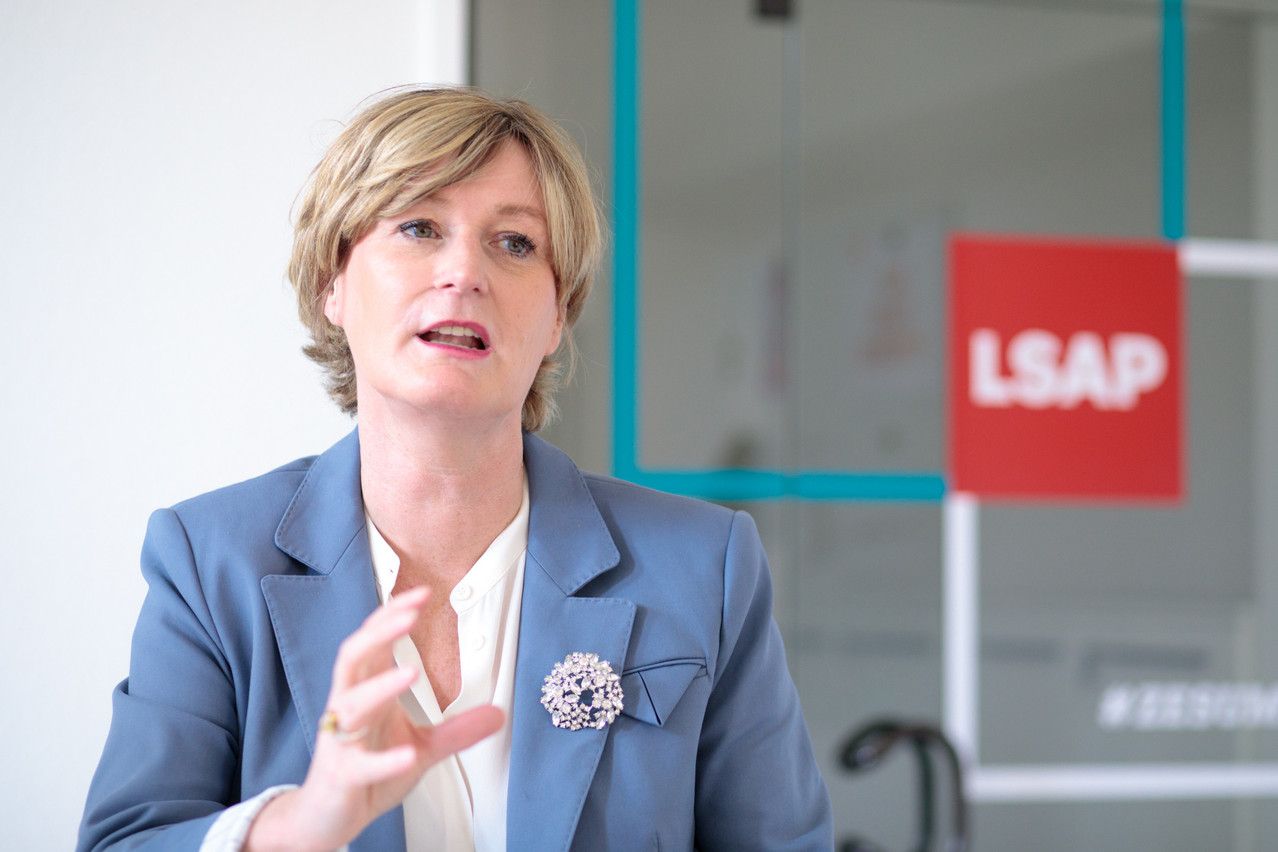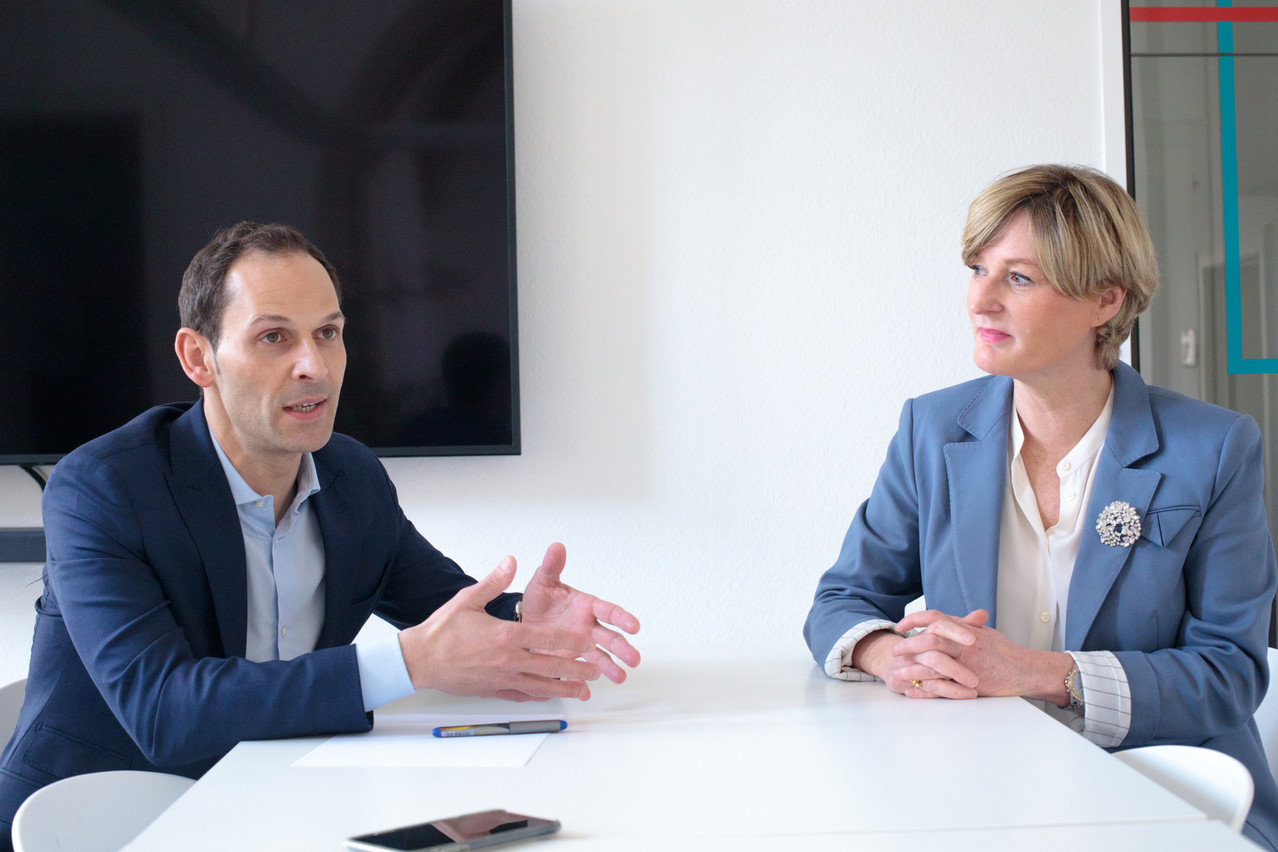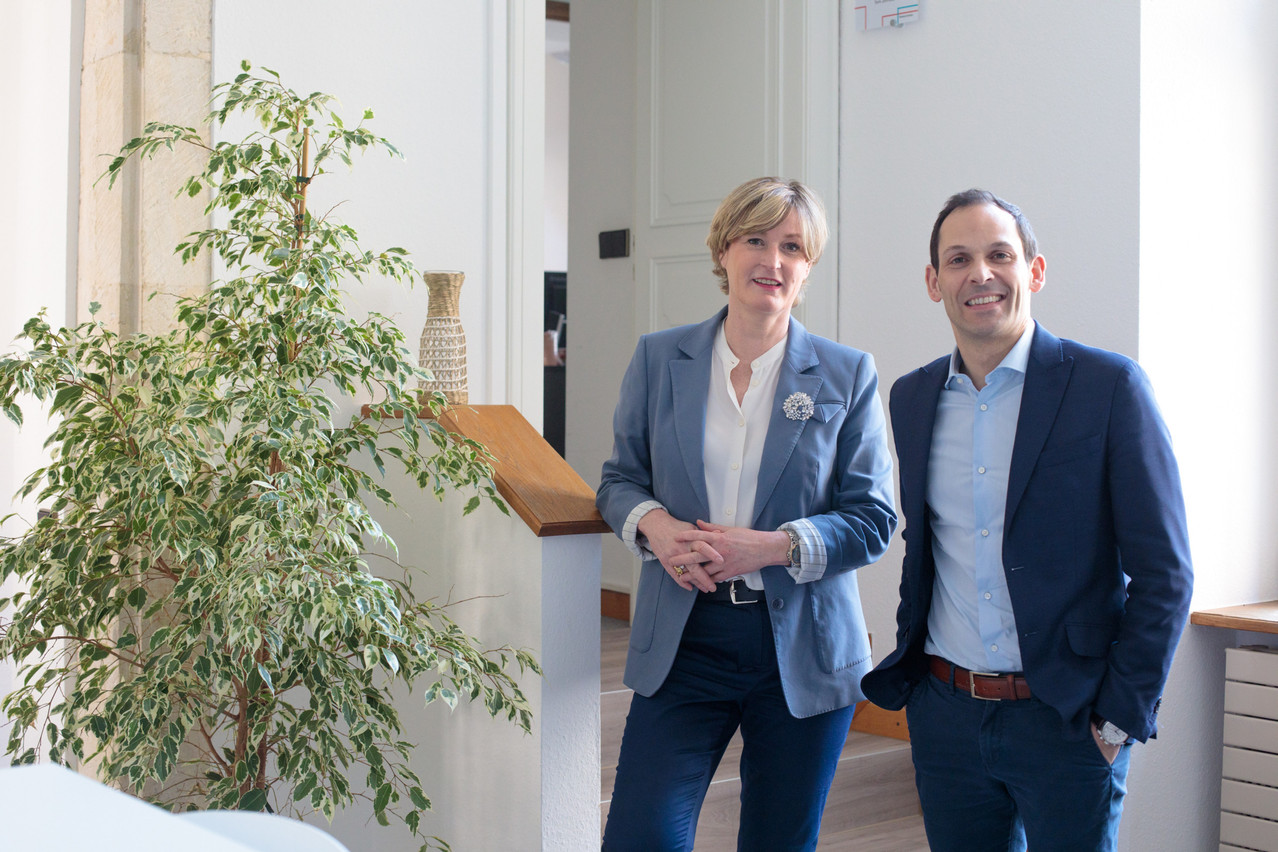The election of MPs Francine Closener and Dan Biancalana to the presidency of the LSAP, as well as that of a rejuvenated steering committee with equal representation, is a “pivotal moment” for the LSAP, in the context of the end of the crisis and the communal and legislative elections in 2023.
The new presidency has set itself the objective of emerging stronger from the elections and teamwork will be necessary to define clear positions. To this end, five priority issues have been established: education, health, labour, housing and the climate crisis. The LSAP sees the resolution to these issues in the form of equal opportunities, affordable housing, eco-socialism.
The exchange in diversity is a strong point of the LSAP.
What do you stand for in terms of renewal?
Dan Biancalana (D.B.). - Given our different backgrounds and characters, we embody the diversity that we also find in the LSAP: people with different backgrounds, who have different views at times and who put them together to bring out the party's position. The exchange in diversity is a strong point of the LSAP.
How are you both different --and complementary?
Francine Closener (F.C.). - Dan has been a member of the party much longer. He knows the intricacies much better than I do. And he thinks more before he speaks! With his experience as a politician and mayor, he knows that he has to be more careful, more patient and more inclusive.
I was a journalist and then a member of the government. I want to do everything right away, I want to move forward much more quickly. It must be in the nature of a journalist who has always had to work with the need for a result at the end of the day. We really complement each other in this respect.
This is the youngest management committee we have ever had, it is a new generation.
The steering committee was elected with equal representation, with many young people. Was this rejuvenation an objective?
F.C. This is the youngest management committee we have ever had, it is a new generation. However, it was not our intention that young people should stand for election. But they have understood that the LSAP is not a party that only lives on its past, that it also has a vision for the future.
In fact, 10 years ago, the LSAP had the image of a party at the end of its strength. We are the oldest party--turning 120 years old this year. A workers' party. And we were criticised for this: there are no more workers, so the LSAP has no reason to exist. But the last few years have shown the opposite. During the pandemic, people understood that solidarity and equality are needed, and LSAP is the bearer of these values. Young people feel called upon to do this.
We want to strengthen our position at the communal and national level following the elections.
Is this a new chapter for LSAP?
D.B. We are about to enter a special situation, with the end of the crisis on the one hand, and the preparation of local and national elections on the other. This is a pivotal moment for the LSAP in the sense that we want to strengthen our position at the communal and national level following the elections. We have set ourselves this goal, but we are not going to achieve it just the two of us, it is the work of a whole team. And this is where this message, this leitmotif, comes in, 'zesummen', together. We lose and we win as a team.
The large popular parties, which sought to bring people together in a very broad way, are in crisis in Europe. Does the LSAP have to reinvent itself?
F.C. We have to make voters understand that we have clear positions on issues that are important for the values of the party, and not try to satisfy everyone. And whether in Portugal, Spain, Scandinavia or Germany, social democratic parties are making a comeback, because people realise that it is very important to have reliable parties that can be trusted.
D.B. As Francine says, there is a return of social democracy. In the late 80s and 90s we had a decline of social democracy, especially through the third way policies of Tony Blair and Gerhard Schröder. But the crisis shows once again that social justice, security and solidarity remain major issues. These are the pillars of the LSAP. And even if our party is aimed at all social strata, it is still people who live in socially vulnerable situations who are in our spectrum--without this being exclusive. This is where we draw our strength from.

“Social democratic parties are making a comeback,” according to LSAP president Francine Closener. “People realise that it is very important to have reliable parties that can be trusted.” (Photo: Matic Zorman/Maison Moderne)
Social democratic parties are making a comeback.
How many members does the LSAP have now? And what is the current dynamic?
D.B. We have 4,500 members. And what we have seen in the context of the health crisis is that we have more new members than resigning members, so that's positive. It's a sign that, from the outside, there is a different perception of the LSAP. We have to take advantage of this momentum, just as we have to take advantage of these new members.
Do you have a target for the number of members? Or is it now more important to convince the voter than to encourage him to take out a party card?
D.B. Of course there is a recruitment strategy. We look at who can bring added value to the party. It is a constant process that is done at the national and local level to identify who is likely to enrich the life of the party.
F.C. We have our thematic working groups, where experts, who are not members, are regularly invited to enrich the discussions. And often this ends up with them asking to become a member of LSAP because they identify with our positions.
There are tendencies to have a minimal social state. But we are in favour of the welfare state.
At the congress you presented five priority issues: education, health, work, housing and the climate crisis. The details are still being worked out. But can you give us an idea of how you want to tackle them, specifically for the LSAP?
D.B. We are not going to address them in detail. We have set up a process at party level, via working groups. The drafting will be done beforehand with a lot of reflection and discussion. This is our current dynamic.
F.C. One example: in the 'education' working group, which I chair, equal opportunities is our main subject, and we are going to put proposals in place to improve it.
D.B. Another example concerning the climate crisis: it is more of an eco-socialist perspective, with the idea of being able to compensate for the challenges linked to the climate crisis through social measures.
F.C . Or in the 'health and social security' group, we have been discussing mental health a lot lately, which is a priority for our minister.
D.B. As well as having a health system that remains efficient and public-oriented. Of course, on housing, affordability is at the heart of the action. But the overarching principle is a strong, present, modern, innovative, seamless social state that mobilises the necessary resources to support the five priorities and beyond. The guarantor of the whole is the social state. There are tendencies to have a minimal social state. But we are in favour of the welfare state.
Luxembourg has shown time and again that it has managed to come back even stronger from these crises
With the succession of crises we are experiencing and the colossal sums of public money involved, how far can the welfare state go? What are its limits?
D.B. There is always the framework of the Maastricht criteria, which we largely respect in Luxembourg. And we must never lose sight of the fact that from the moment the welfare state intervenes and provides more support for the most vulnerable people, the whole of society benefits. Otherwise, it means relying on individual responsibility, without being interventionist--but that is another economic model, that is the minimalist state. In Luxembourg, we are very far from that. And the crisis has shown us all the benefits of a strong and present social state.
F.C. And we saw it during the pandemic: everyone has to make an effort during crises, not only the state, but also companies and private individuals, and it is this solidarity that has to come into play in any crisis management. Luxembourg has shown time and again that it has managed to come back even stronger from these crises.

"If the economy is doing well, the financial situation of the state, in terms of public finances, is also doing well", according to LSAP President Dan Biancalana. (Photo: Matic Zorman/Maison Moderne)
But the state cannot invest without limits either...
D.B . The social model we are working on depends on public finances, which depend on the state of economic, financial and industrial health. If the economy is doing well, the financial situation of the State, in terms of public finances, is also doing well.
Doesn't Luxembourg's good economic health rely too heavily on the financial sector?
F.C. We have been diversifying the economy for 20 years now, and of course we have to make ever greater efforts.
D.B. Especially for a small country, we must not rely on just one pillar, only on finance, but also on health technologies and the whole area of logistics: these are the new pillars that Luxembourg is giving itself in terms of economic diversification.
F.C. Our biomedicine house in Belval was inaugurated a fortnight ago. It is a very interesting niche, with all the research centres we have in Luxembourg. And I think it is very important to play this role of 'front runner' in the field of data, for example in terms of data centres or projects that Luxinnovation is developing concerning the collection and use of data. We need to focus even more on the idea of digitalising the economy.
We have been diversifying the economy for 20 years now, and we must of course make ever greater efforts.
In the field of the economy, does the LSAP need promising ideas like space, which supported when he was the minister of the economy?
F.C. The space idea was good, because we managed to attract a lot of companies that invested in research. But I don't think that we need to do bling every year. And the minister for economic Affairs, Franz Fayot (LSAP), has succeeded in transposing Rifkin's idea into a more Luxembourg-style model.
D.B. As Francine says, we need ideas that distinguish us. Doing niche projects like space gives us international coverage, media coverage. But maybe not all the time. We also need to build on what we have now and maintain it, for example with industrial policy: there is a pool of jobs throughout the country, but it is struggling at the moment.
Excessive growth at all costs will not benefit the country.
Does the Luxembourg economic model, which requires strong growth, remain viable in the context of the climate crisis?
F.C. It is the art of politics to ensure that we can, on the one hand, live, finance our social security systems and our pensions, and, on the other hand, remain reasonable in terms of resource consumption.
D.B. As long as it is a reasoned growth, which takes into account the social and ecological aspects, the right balance is found. Excessive growth at all costs will not benefit the country: the growth system of recent years has had an effect on all our public infrastructures, particularly the mobility aspect, with traffic jams on the motorways and the saturation of public transport. Do we want to live with this on a daily basis?
The [ecological] measures can only be implemented with a social dimension.
F.C. How can we live in the coming years as we have done for the past 20 years, but without this exaggerated consumption of resources, and at the same time without making sacrifices that most of the population cannot afford? That's the main problem, in my opinion.
And in that sense, I'm glad to have a young steering committee, because they may have different ideas than my generation or my parents' generation. This generation has a different awareness, and slowly it will catch on.
Doesn't the urgency of taking action against the climate crisis mean that it has to take priority over other aspects, such as the economy or even social issues?
F.C. Measures can only be implemented with a social dimension. They have to be accepted, and they are only accepted if people can afford them. The LSAP is the guarantor of this balance.
We have to find a balance between the need to create new jobs in a competitive environment and the establishment of new companies, which must be environmentally justifiable
D.B. Yes, it has to be socially affordable and financeable for the people involved. A whole section of our population does not have the financial capacity to make the necessary investments for certain measures. So we need to help these people more.
The same applies to the economy: when it comes to setting up businesses in the broadest sense, the ecological aspect must be taken into consideration in relation to productivity and the investments made. And Luxembourg, with 4.5% unemployment, also needs to generate jobs. So we have to find a balance between the need to create new jobs in a competitive environment and the establishment of new companies, which must be environmentally justifiable.
This story was first published in French on . It has been translated and edited for Delano.










